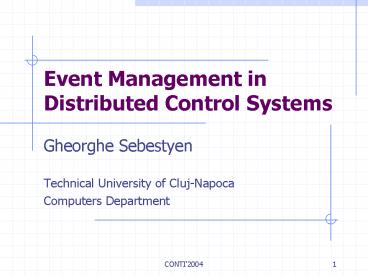Event Management in Distributed Control Systems - PowerPoint PPT Presentation
Title:
Event Management in Distributed Control Systems
Description:
Event Management in Distributed Control Systems Gheorghe Sebestyen Technical University of Cluj-Napoca Computers Department – PowerPoint PPT presentation
Number of Views:48
Avg rating:3.0/5.0
Title: Event Management in Distributed Control Systems
1
Event Management in Distributed Control Systems
- Gheorghe Sebestyen
- Technical University of Cluj-Napoca
- Computers Department
2
Content
- Introduction goals and motivations
- Event management in a distributed environment
- An Event management service model
- Analytical evaluation of the reaction time to
events - Conclusions
3
Events in control systems
- control systems
- event-driven reactive systems
- time-driven time (clock ticks) drives the
system - event handling
- in single computer systems
- Input/Output pooling
- Interrupts ISRs
- in distributed systems
- not a trivial task
4
Events in Distributed control
- problems concerning events
- detection, notification, ordering
- actions (tasks) triggering as response to events
- evaluation of time delays between event and
action - proposed solutions
- MMS (Manufacturing Message Specification)
- Virtual devices Event objects
- ROOM (Real-time Object Oriented Model)
- Interface objects for I/O and signaling
operations
5
A system model based on Distributed services
- Distributed system a collection of autonomous
and distributed services - For a distributed control system
- data acquisition service
- resource management service
- supervision and control service
- time and synchronization service
- event management service
6
A fully distributed Event management service
7
The Event Management service
- Functions
- definition and configuration of data structures
that describe and store events - detection of conditions that trigger events
- dynamic event logging
- event notification mechanisms
- task scheduling based on the pending events-
event messaging - event ordering and synchronization mechanisms
- remote access to event objects
- unique time reference for event time-stamping
8
Components of a Local Event Manager
9
Evaluation of the reaction-time to events
- The computational model
- tasks are statically allocated to network nodes
- every node has a task scheduler that use the Rate
Monotonic scheduling algorithm this algorithm is
optimal for a single computer system - tasks communicate through messages, on the
network - messages are scheduled with a TDMA (Time Division
Multiple Access) algorithm, which means that
every node has a predefined time slice for
communication - a task or message is delayed by its predecessor
(message or task) in the transaction
10
The reaction time for a task
- without communication
- ri Ci ? (?ri/Tj? )
- jgtprior
- where ri the reaction time of task i
- Ci the execution time of task i
- Tj the period of a task j that have a
higher priority than task i - if communication is involved
- ri Ji wi
- where Ji the launching jitter, caused by the
predecessor message - wi the reaction time caused by the task
scheduling algorithm
11
The reaction time for a task (cont.)
- wi Ci ? (?(Jjwi)/Tj? Cj)
- jgtprior
- a recursive formula
- ri(k1) Ci ? (?ri(k)/Tj? Cj)
- jgtprior
12
Delivery time of a message
- rm ?(1 Im)/S? TTDMA
- where rm the delivery time of message m
- Im the number of messages that have higher
priority than message m and which may be
launched before message m - S number of messages that can be transmitted
by a node in its time slice of a TDMA period - TTDMA the TDMA protocols period
- The term Im may be evaluated with the following
expression - Im ? ?(J j rm)/Tj?
- jgtprior
- where Jj the delay (jitter) caused by the
task that generate the message - Tj the period of a message j that have a
higher priority than message m
13
Iterative computation
- R1 (m1) ?RM( J1(m))
- R2 (m1) ?RM( J2(m))
- ..
- Rn (m1) ?RM( Jn(m))
- Rret(m1) ?TDMA(Jret(m))
- J1(m1) ?1(Rret(m1))
- J2(m1) ?2(Rret(m1))
- ..
- Jn(m1) ?n(Rret(m1))
- Jret(m1) ?ret(R1(m1), R2(m1), Rn(m1))
14
Conclusions
- event management is a critical task in any
control system - distributed control systems require special event
detection, notification and ordering mechanisms - the service-based event management approach is
proper for a distributed environment - a scalable, reliable and fault-tolerance solution
- the reaction time of a distributed system can be
evaluated with an analytical method































